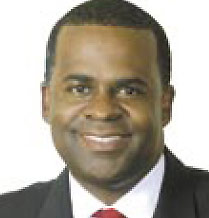Top News
Chinese ties a key to success for a global city
By Tan Yingzi (China Daily)
Updated: 2010-11-01 11:05
 |
Large Medium Small |
 |
|
Kasim Reed is mayor of Atlanta. |
ATLANTA, Georgia - Kasim Reed, the mayor of Atlanta, knows his city cannot become a truly international capital without a strong relationship with China.
Reed, who regards himself as a citizen of the world, has for years been cultivating his personal engagement with China through participation in local Chinese-American activities and in promoting Chinese businesses.
"I have watched and admired China's growth and development, and I don't think you can be a truly international city without having a strong relationship with China," he told China Daily in his office last week.
Reed, who will be making his first trip in the first quarter of next year, said he is amazed by the high-speed rail development and the successful Beijing Olympics.
China is "a country that works well" and he said he can learn a great deal from his counterparts.
Reed has included China into his vision about the city.
"I believe we are going to be the logistics center for the Western Hemisphere," he said.
"At the end of the day, the city of Atlanta is going to move from being an aspirational world-class city to being a city that by every important measure is world class.
"Which is why the relation with China is so important as we move toward increasing globalization and interconnectedness."
Atlanta, dubbed the Heart of the South or the Capital of the South, is well known in China because of the 1996 Olympics. But its reputation as an important transportation and business hub in the US is less familiar.
It ranks fourth in Fortune 500 companies headquartered within city boundaries, behind New York City, Houston and Dallas.
Many multinational companies, such as The Coca-Cola Company, Home Depot and UPS, are based in the city.
Reed believes the city's strong fundamentals can be very attractive to Chinese investors.
In addition to the "irreplaceable" transportation networks in air, railroad and highways, pleasant weather and relatively low business operation costs, the city has a large smart workforce as it becomes a popular destination for the well-educated young.
"We are the No 1 city in the US attracting college students aged between 24-35 years old," he said.
Atlanta's advantages have been recognized by many Chinese businesses. Sany, the largest heavy equipment manufacturer in China, Hisense, a major electronics manufacturer, and Huawei, the country's largest telecommunications equipment supplier, have built their US bases in the city.
In December last year, Chinamex, which helps Chinese firms expand overseas, was hired by the Hubei provincial government, in Central China, to operate a China Hubei Enterprises Marketing Center in Atlanta.
Chinamex, which has similar offices in Amsterdam and Dubai, will bring more than 100 Chinese companies through its first US office.
To enhance the China relationship, Reed has mapped out a strategy, which starts with a "complete personal engagement".
In addition to meeting diplomats and business executives, his administration is learning from UPS, a company with a very strong relationship in China, about how to develop stronger ties, its culture and tradition related to business practices and how to identify strong partners.
Local Chinese-American communities, such as the National Association of Chinese Americans (NACA), have also played significant roles in promoting understanding and relationship between two countries, Reed said.
The 2010 US China Business Conference, hosted by NACA, will start on Monday in Atlanta. It will bring together industry leaders from the US and China to share their practices and strategies on pursuing markets in China.
But Reed also knows Atlanta will face fierce competition accessing China from other cities and countries.
"There is a long line," he said. "The question is how can you break through and how can you stand out?"
China Daily